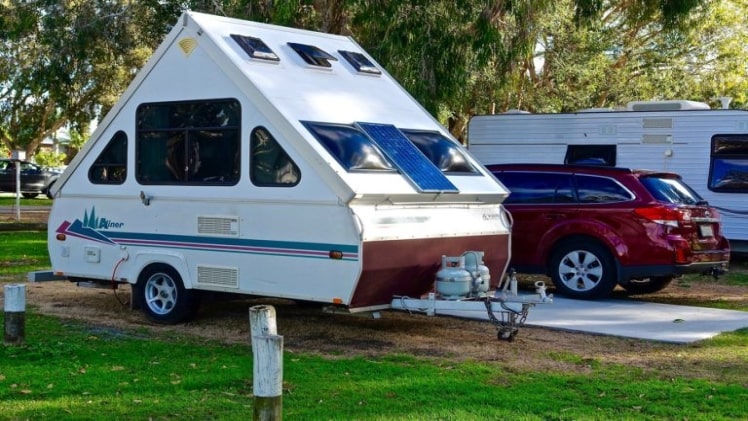Traveling with an RV is not that new. In fact, millions of such vehicles have been sold in America in the past years. It also brought lots of revenue in the van industry making RVs a great tool for travel. The vast choices of high-quality RVs can be overwhelming, especially if it is your first-time buying. You will consider many factors, such as its overall condition during the sale to ensure you are investing in a good RV.
This post will also reveal some red flags about RVs that you should know. It will help you to come up with the best decision for your next trip.
Different Types of RV
RVs come in various designs, depending on your choice. You can pick between nine types of RVs that differ in size and even on how they look. These include:
Travel Trailers: This is the most popular type of RV that can fit a family size per ride. It has a wide range of floor sizes to accommodate a huge number of guests.
Fifth Wheel: This one suits an owner with a fun-filled lifestyle and loves adventures. It provides the best comfort and is bigger than travel trailers ideal for week-long camping trips. However, it is harder to tow compared to other vehicles.
Fold-Down Trailers: First-time RV owners would be at ease with a fold-down trailer that does not require extreme towing. It is also a small vehicle but can offer enough sleeping capacity.
Small Camper: This is the tiniest RV type you can buy in the market, but so perfect for camping and daily trips. It does not compromise comfort and freedom and is also easier to park in campgrounds due to its size.
Toy Haulers: If you consider making RVs a living space, choose none other than toy haulers. It is way bigger and has significant advantages, like a huge space, garage area, and storage space. This is probably the most expensive on the list.
Other RV Types: One way to distinguish what type of RV you need is by knowing whether it is gas or diesel-powered.
Choosing an RV also depends on what type of travel you will be using it. The first three options are ideal if you plan to tow the vehicle. While the subsequent types of RV are subject to driving.
Cost
All kinds of RV have value, regardless of whether it is pre-owned or a new model. According to Jim Harmer, the cost of an RV can easily depreciate at least 21% of its original price after a few years. The total cost also depends on the vehicle’s condition, wherein repair expenses can be added.
Finding the best RV at a reasonable price is so risky. However, you can avoid wasting money by comparing the prices of reliable traders online. Sellers asking for payment via check is a red flag and should be avoided.
Mandatory Inspection
RV inspection is necessary before deciding to point out potential problems earlier. You may hire someone who will check the vehicle’s interior and exterior to name vital repairs.
First, see beneath the surface of the RV if there is mold buildup caused by leaks. This might cause a foul odor and even trigger health issues in the long run. Mold also exists in the bathroom or cabinets that you must check upon.
Additionally, floor damage reduces the value of an RV. It might not be visible at first glance, however, even small wear and tear in the floor lining can become a huge problem later on. The floor space should be stable and durable enough to carry all of your belongings.
Double-check the RV whether its exterior suffers from rusting. Touch the walls and feel any sign of corrosion. Lastly, make sure the tires are in a good condition. Tires should be replaced every 5 years for better performance.
Learn the RV’s History
Each vehicle has an identification number that you can use to check its history. You will know whether the van is sold legally and if it has been damaged due to an accident. This matters to prevent getting an RV out of scams, which is one of the red flags when purchasing a vehicle.
Test Drive
A test drive can help buyers better check how the RV works in particular situations. The seller should ride on to discuss things clearly. On the other hand, you can also ride as a passenger to feel how the RV is moving.
As the van is moving, listen carefully to the noises, as this may indicate a problem with the engine or the wheel. Try different speeds to see if it works very well. You may also roam around the highway or tight spaces to attest to the van’s ability.
Insurance
Accidents are so uncertain that you need to protect yourself from possible expenses through insurance. The coverages differ among the types of RV and liability extensions. With towable vehicles, it extends the insurance cover from the tow van.
Final Thoughts
Putting on air conditioning for your RV can make travels more comfortable. It is believed that each type of RV has this feature to bring convenience along the trip. This is best for a camping trip during hot weather to feel cozy at night. However, an RV air conditioner requires additional cost for maintenance and repairs to enjoy its full functionality. This is a worthy investment for those who travel a lot with an RV.
Maintenance
Owning an RV is a great way to see the country and spend time with family and friends. However, RVs require regular maintenance in order to keep them running smoothly. Here are a few things to keep in mind when it comes to RV maintenance:

